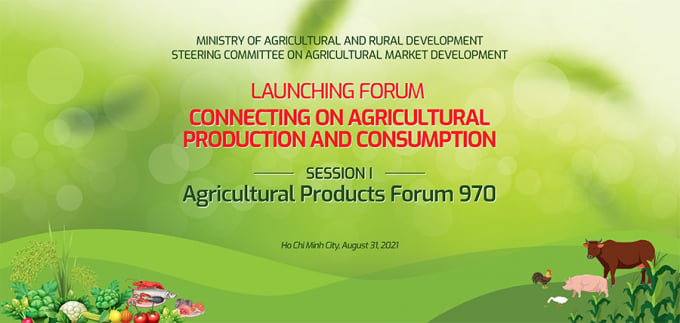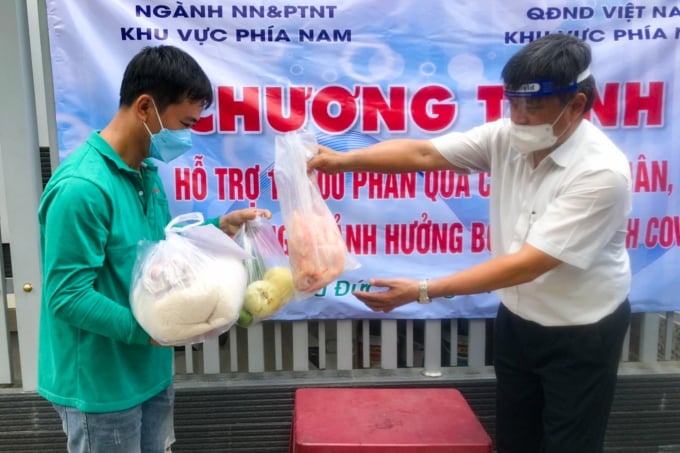May 30, 2025 | 16:46 GMT +7
May 30, 2025 | 16:46 GMT +7
Hotline: 0913.378.918
May 30, 2025 | 16:46 GMT +7
Hotline: 0913.378.918

On August 31, the Ministry of Agriculture and Rural Development inaugurates a conference titled "Connecting agricultural production and consumption," which will bring together 63 provinces, cities, and almost 200 companies, cooperatives, and manufacturers from around the country.
The forum was tasked with initiating on the premise of inhering good results from linking and consuming agricultural operations under the auspices of Working Group 970. Its objective is to establish and connect all stages of agricultural product production, processing, harvesting, circulation, and consumption, as well as to foster tighter and multilateral "linkage-cooperation" between management authorities, companies, and farmers.
Members of the Forum get assistance via a variety of initiatives, including promotion, information dissemination, and involvement in agricultural supply-demand linkages established by MARD's Steering Committee on agricultural product market development. Several networks of agricultural production, supply-demand, circulation, and consumption in provinces and cities have been affected by the Covid-19 pandemic uncertainty.

Deputy Minister of Agriculture and Rural Development Tran Thanh Nam - Head of Working Group 970 of the Ministry of Agriculture and Rural Development presents gifts to people in difficulty in Ho Chi Minh City. Photo: Minh Sang.
As a result, the forum was established to address three deficiencies in the country's agricultural industry: Overcoming the bottleneck of a "fragmented, small, spontaneous" production base; Formulating policies, searching for, negotiating, and connecting agricultural product consumption markets; and Promoting the leading role and orientation of enterprises in agricultural production, in order to create productive capacity.
The creation was prompted by the current operations of Working Group 970, which recognized the urgent need to remove bottlenecks and blockades in agricultural production, processing, harvesting, circulation, and consumption.
As of August 31, Working Group 970 has established 1,300 supply points; 58 warehouses for the collection of agricultural goods and food with a daily consumption volume of up to 1,000 tons during the execution of Ho Chi Minh City's social distancing measures.
The forum's primary responsibilities include the following:
(1) Trade promotion information, linking agricultural goods, agricultural materials, and agricultural and rural tourist items to supply and demand.
(2) Statistical information, synthesis, forecasting, and assistance with production management, trade promotion, and the linkage of agricultural product supply and demand.
(3) Digital transformation information, promotion of the use of growing area codes, organization of chain links, traceability, and assurance of the safety of agricultural goods.
(4) Educating and strengthening production organizations, as well as fostering the link between supply and demand for agricultural and rural tourist goods.
(5) Proposing to eliminate impediments and impediments in the cycle of agricultural product production-consumption.
The conference will focus on agricultural goods according to seasonal crops and will include the following three levels of information:
(1) Projected agricultural product, specialty, and OCOP product development, supply and buying networks, and focal centers such as cooperatives, cooperative groups, farms, and businesses.
(2) Collecting data on planting area management. Introducing agricultural products with unique local characteristics, providing information on planting season, harvest time, output, and quality, assisting state management agencies in directing the production, and assisting localities, enterprises, and cooperatives in organizing agricultural product production and consumption.
(3) Developing agricultural and rural tourist models through developing roadmaps, promoting information, and working with local governments and companies. Utilizing information technology to organize and promote the community calendar of tourism attractions; Updating tourist attractions, establishing standards for community tourism services, and establishing tourist routes. Consultancy services to standardize tourist sites in accordance with OCOP program requirements and to participate in the assessment and ranking process.
With the objective of assisting Vietnam's agriculture in maintaining its growth momentum, developing into a strong economic pillar, and achieving a total export turnover of USD 50 billion in 2025 and USD 60 billion in 2030, the forum on agricultural production and consumption is expected to serve as a reliable companion to the country's agricultural industry in the coming years.
Translated by Linh Linh

(VAN) Vaccinating juvenile pangasius helps reduce disease, antibiotic use, and farming costs, increasing profits for export-oriented farmers in An Giang.

(VAN) Due to a limited supply of workforce and competitive recruitment requirements, businesses struggle to retain talented veterinary human resources.

(VAN) WOAH’s guidance aims to mitigate disease risks through a One Health approach that balances economic, conservation, and public health interests.

(VAN) Ms. Nguyen Thi Dung, Deputy Director of Ngoc Hoang Cooperative, shared about the journey of bringing dragon fruit to Europe, achieving annual revenues in the billions of VND.

(VAN) Bamboo products from Thang Tho Bamboo Cooperative have reached many countries around the world, while also creating jobs for local workers.

(VAN) The Management Board of Con Dao National Park reported that a green sea turtle, tagged in the Philippines, has traveled thousands of kilometers to lay 84 eggs on Bay Canh Islet.

(VAN) Green technology is paving a new path for sustainable aquaculture in the Mekong Delta in particular and across the country in general, helping reduce emissions and adapt to climate change.